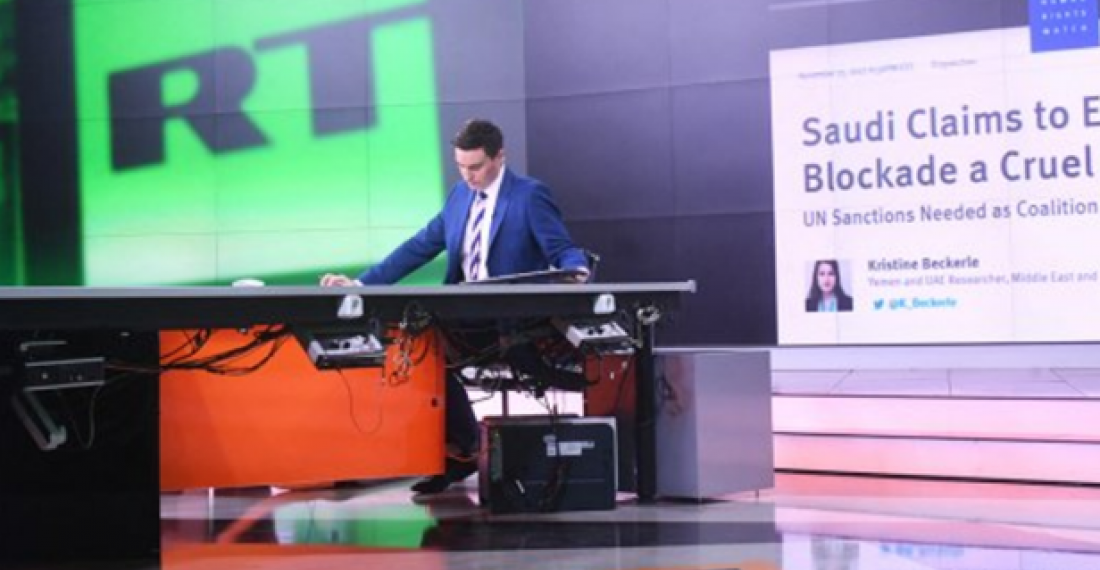The Russian news channel RT (Russia Today), which has been banned from broadcasting in the European Union since 2 March, is establishing itself in most francophone African countries.
This new interest in the African continent is justified in particular by the size of the audience, where 60% of the 300 million French speakers reside in Africa, according to the President of RT France, Xenia Fedorova. Thus, at the end of January, the influential media had registered several Internet domain names revealing its development ambitions such as "Rt-afrique.com", "Africa-rt.com", "Rtafrica.media", "RtAfrique.online".
RT's editorial team has also increased its visibility in North Africa by placing a regional correspondent in Tunis as well as in East Africa where it is setting up a newsroom project in Nairobi, the Kenyan capital. It is also expecting to open to co-operation with a number of the digital industries, and to recruit a number of journalists and presenters in the coming months. The launch of the "Africonnect" programme covering African news from a Russian perspective reinforces Moscow's reach towards a new African audience.
Burkina Faso is already another beacon in the Sahel region through another Kremlin-funded news platform, Sputnik, while RT is already present in Senegal, Côte d'Ivoire, and Cameroon.
Although the audience share has not yet made any tangible breakthrough in the Maghreb, Senegal and the Ivory Coast, the creation of an RT Africa site will shift the audience share in favour of the Russian media, according to Maxime Audinet, a researcher in influence strategies at the strategic research institute of the Ecole Militaire. The success of Sputnik in Burkina Faso, which has been present in Ouagadougou for several years, and which constitutes the fourth largest audience of the Sputnik France site after France, Belgium and Canada, demonstrates the capacity of Russian media to flourish in Africa, according to Maxime Audinet.
The growing presence of the Kremlin media is just one symptom of Russian political strategy on the continent. The Kremlin has been forming military alliances with African countries suffering from jihadist threats or political instability over the past few years, including Libya, Mali, Sudan, the Central African Republic, and Mozambique.
The Wagner Group, a private para-military group under the orders of the Kremlin, has become a privileged partner of many African states such as Libya, Mali, Syria, and the Central African Republic. The group, designated as a “mercenary group” by Western countries, is reportedly paid more than $10 million a month by the Malian state for its military assistance in the fight against al-Qaeda and ISIL affiliated terrorists in the region.
The presence of Russian mercenaries in Mali reinforces Russia's desire to grow its prestige and influence in Africa and is part of a wider campaign to disrupt long-established power dynamics in the region. Russian authorities deny that Wagner's contractors are carrying out clandestine combat missions on behalf of the Kremlin in Libya, Syria and Mali.
However, the expansion of Russia’s voice on the African continent faces a major obstacle - funding. Russia Today's budget had been drastically reduced after the economic sanctions imposed on Russia following the annexation of Crimea in 2015. The current fall of the rouble and the economic sanctions imposed by the West following the annexation of Ukraine could hinder Russia's expansionist ambition in Africa, unless of course Moscow decides it wants to prioritise this expenditure.
France is very wary of the expansion of Russian propaganda outlets in Africa, given the anti-French political narrative of Sputnik and RT, which seeks to undermine the credibility of French and European military action in the fight against terrorism in the Sahel and Maghreb and thus further weaken its historical relations with African countries.
Mali is a relevant example of this audience for anti-French opinion. Indeed, since the Malian military junta reneged on a promise to hold elections this month, and instead suggested it would remain in power until 2025, all the while hiring Russian mercenaries in the fight against terrorism, relations between Europeans and Malians have worsened.
President Macron announced mid-february that the withdrawal of the 2,400 French troops from Mali would take between 4 and 6 months, during which time military operations against the Islamists in Mali will be limited.
An escalation of violence in the region could not only threaten mining operations and the stability of French partners in the region - such as Senegal or Cote d'Ivoire - but could also trigger a significant wave of immigration from the Sahel to Europe.






